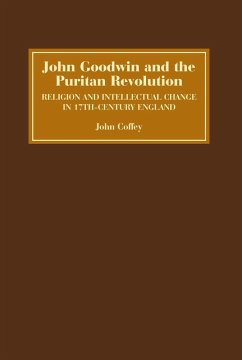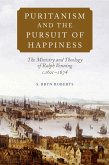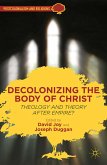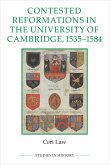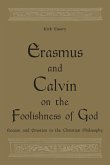`A major contribution to our understanding of the English Revolution.' Ann Hughes, Professor of Early Modern History, Keele University.
John Goodwin [1594-1665] was one of the most prolific and controversial writers of the English Revolution; his career illustrates some of the most important intellectual developments of the seventeenth century. Educated at Queens'College, Cambridge, he became vicar of a flagship Puritan parish in the City of London. During the 1640s, he wrote in defence of the civil war, the army revolt, Pride's Purge, and the regicide, only to turn against Cromwell in 1657. Finally, repudiating religious uniformity, he became one of England's leading tolerationists.
This richly contextualised study, the first modern intellectual biography of Goodwin, explores the whole range of writingsproduced by him and his critics. Amongst much else, it shows that far from being a maverick individualist, Goodwin enjoyed a wide readership, pastored one of the London's largest Independent congregations and was well connected tovarious networks. Hated and admired by Anglicans, Presbyterians and Levellers, he provides us with a new perspective on contemporaries like Richard Baxter and John Milton. It will be of special interest to students of Puritanism,the English Revolution, and early modern intellectual history.
JOHN COFFEY is Reader in Early Modern History at the University of Leicester.
John Goodwin [1594-1665] was one of the most prolific and controversial writers of the English Revolution; his career illustrates some of the most important intellectual developments of the seventeenth century. Educated at Queens'College, Cambridge, he became vicar of a flagship Puritan parish in the City of London. During the 1640s, he wrote in defence of the civil war, the army revolt, Pride's Purge, and the regicide, only to turn against Cromwell in 1657. Finally, repudiating religious uniformity, he became one of England's leading tolerationists.
This richly contextualised study, the first modern intellectual biography of Goodwin, explores the whole range of writingsproduced by him and his critics. Amongst much else, it shows that far from being a maverick individualist, Goodwin enjoyed a wide readership, pastored one of the London's largest Independent congregations and was well connected tovarious networks. Hated and admired by Anglicans, Presbyterians and Levellers, he provides us with a new perspective on contemporaries like Richard Baxter and John Milton. It will be of special interest to students of Puritanism,the English Revolution, and early modern intellectual history.
JOHN COFFEY is Reader in Early Modern History at the University of Leicester.
Dieser Download kann aus rechtlichen Gründen nur mit Rechnungsadresse in A, D ausgeliefert werden.

